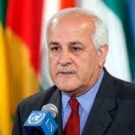Speaker

Ambassador Dr. Riyad H. Mansour
Ambassador and Permanent Observer of the State of Palestine to the UN
Moderator
Event Summary
As part of its Quarterly Diplomatic Luncheon series, Arab Center Washington DC hosted on August 10th Ambassador Dr. Riyad H. Mansour, Ambassador and Permanent Observer of the State of Palestine to the UN and non-resident Ambassador of the State of Palestine to Costa Rica and Dominican Republic. Ambassador Mansour presented a Palestinian perspective on the recent international peace initiatives in the Middle East, specifically the French proposal.
The French initiative was first proposed by the Hollande government last year. In its original form, it consisted of a draft United Nations Security Council resolution that would set forth clear parameters for Israeli-Palestinian peace, along with mechanisms and a timeline for achieving them. The plan represents the first French-led initiative and comes after the Obama Administration’s choice not to revive the negotiation process after Secretary of State John Kerry threw in the towel in 2014 following nine months of talks that ended in failure.
The conversation with Ambassador Dr. Riyad H. Mansour sought to understand the prospects for success of this new French peace initiative. In his opening remarks, Executive Director of Arab Center Washington DC Khalil Jahshan posed the questions whether the French initiative could “stand a chance,” why or why not, and if it meets the basic requirements for realizing the fundamental rights of the Palestinian people, pointing that there is no better person than Ambassador Mansour to answer such difficult questions.
After discussing the uniqueness of this proposal and its features, Ambassador Mansour recognized that the French peace initiative raises “several important questions” that are “very difficult to answer.” Ambassador Mansour provided a cohesive explanation of the historical background that culminated in the French-led proposal. Already during the Sarkozy Administration, Paris was “fed up with the Quartet [the United Nations, the United States, the European Union, and Russia]” and was pushing for a new approach to be tried. Hence, the foremost significance of the French initiative is that “it is abandoning the traditional European approach of doing nothing until the US acts,” instead enabling the EU to start “an independent initiative to push the US, and try to break the deadlock.”
Ambassador Mansour argued that the French Peace Initiative is significant for its new proposed approach. The French proposal is not another bilateral set of negotiations between the Israelis and the Palestinians, which were tried and failed for the past 23 years, but “a new, collective approach.” The French initiative also represents “an understanding from the French that the international environment [in] dealing with complicated questions… cannot be resolved through one country or through bilateral negotiations.”
Will the French Initiative succeed? Ambassador Mansour believes that “this is not just an abstract issue to debate as a theoretical question.” There needs to be actual implementation on the ground. The Palestinians cannot rely solely on the French initiative, and need to do more. Direct Arab engagement, especially by Saudi Arabia and Egypt, is crucial as well. Moreover, the P5+1 engagement is cornerstone, because having all such parties involved will ensure that neither the Palestinians nor the Israeli would find it convenient to “run away from their responsibilities.”
Ambassador Mansour asserted that Israeli settlements in the West Bank are recognized as illegal by the great majority of the member states of the United Nations. Ending the growing illegal settlement activity and the Israeli occupation is of foremost importance to stop fueling extremism in the region. The French-led project must therefore work as a collective political process; its failure could lead to more instability across the Arab world. “If people become more frustrated, and lose hope that the occupation will end, then they might take issues in their own hands, and that is the best recipe for extremists,” who will have the ripe environment to recruit amongst Arab youth. In addition, the occupation is enabling extremism in the Israeli society and “exposing the ugly face” of the apartheid state. The lack of hope and lack of progress in opening doors to a meaningful political process would likely drag the region into further chaos.
Although UN Security Council resolutions and international peace initiatives might seem like mere rhetoric with no actual impact on the ground, the Palestinians cannot stop pursuing them, said the ambassador. Nonetheless, Ambassador Mansour emphasized that the resolution of the Palestinian issue is a duty of everyone in the international community, not only the Palestinians and the Israeli. The French initiative, therefore, represents a unique opportunity. If this “historical opportunity is not utilized, then those who are pushing [the Palestinians] in the direction of extremism should bear the responsibility of what will unfold.”
“If the White House, whoever will be the next president, will continue to ignore resolving the Palestine question on a just basis, thinking that the status quo will remain for a long period of time, they will be making a big mistake.” Ambassador Mansour concluded that the resolution of the conflict is therefore a key issue for the next Commander in Chief, especially because the only “sound strategy for confronting extremism in the Middle East is through dealing with hope for the Palestinians… on the basis of ending the occupation within a reasonable time-frame and allowing for the independence of the State of Palestine.”
Related Papers
The Paris Initiative and US Middle East Policy: Paving the Way for the 4th Intifada? Why justice is the only roadmap to peace. By Tamara Kharroub
Assessing the Potential Impact of the Paris Peace Conference: Vive la France or Forget Paris? By Yousef Munayyer

